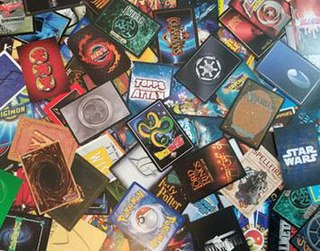
A smart card, chip card, or integrated circuit card is a physical electronic authorization device, used to control access to a resource. It is typically a plastic credit card-sized card with an embedded integrated circuit (IC) chip. Many smart cards include a pattern of metal contacts to electrically connect to the internal chip. Others are contactless, and some are both. Smart cards can provide personal identification, authentication, data storage, and application processing. Applications include identification, financial, mobile phones (SIM), public transit, computer security, schools, and healthcare. Smart cards may provide strong security authentication for single sign-on (SSO) within organizations. Numerous nations have deployed smart cards throughout their populations.

A collectable is any object regarded as being of value or interest to a collector. Collectable items are not necessarily monetarily valuable or uncommon. There are numerous types of collectables and terms to denote those types. An antique is a collectable that is old. A curio is a small, usually fascinating or unusual item sought by collectors. A manufactured collectable is an item made specifically for people to collect.
A virtual economy is an emergent economy existing in a virtual world, usually exchanging virtual goods in the context of an online game, particularly in massively multiplayer online games (MMOs). People enter these virtual economies for recreation and entertainment rather than necessity, which means that virtual economies lack the aspects of a real economy that are not considered to be "fun". However, some people do interact with virtual economies for "real" economic benefit.

A trading card is a small card, usually made out of paperboard or thick paper, which usually contains an image of a certain person, place or thing and a short description of the picture, along with other text. There is a wide variation of different types of cards.

Exonumia are numismatic items other than coins and paper money. This includes "Good For" tokens, badges, counterstamped coins, elongated coins, encased coins, souvenir medallions, tags, wooden nickels and other similar items. It is related to numismatics, and many coin collectors are also exonumists.
In tabletop games and video games, game mechanics are the rules that govern and guide the player's actions, as well as the game's response to them. A game's mechanics thus effectively specifies how the game will work for the people who play it.
Artificial scarcity is scarcity of items despite the technology for production or the sufficient capacity for sharing. The most common causes are monopoly pricing structures, such as those enabled by laws that restrict competition or by high fixed costs in a particular marketplace. The inefficiency associated with artificial scarcity is formally known as a deadweight loss.

In computing, a news aggregator, also termed a feed aggregator, feed reader, news reader, RSS reader or simply an aggregator, is client software or a web application that aggregates syndicated web content such as online newspapers, blogs, podcasts, and video blogs (vlogs) in one location for easy viewing. The updates distributed may include journal tables of contents, podcasts, videos, and news items.

Windows CardSpace is a discontinued identity selector app by Microsoft. It stores references to digital identities of the users, presenting them as visual information cards. CardSpace provides a consistent UI designed to help people to easily and securely use these identities in applications and web sites where they are accepted. Resistance to phishing attacks and adherence to Kim Cameron's "7 Laws of Identity" were goals in its design.
Allegiance: War of Factions is an out-of-print social and political collectible card game set in a medieval city-state undergoing political turmoil due to the death of its king. It was created by Andrew Grierson and published by Lucid Raven Productions in 2004.

A collectible card game (CCG), also called a trading card game (TCG) among other names, is a type of card game that mixes strategic deck building elements with features of trading cards, introduced with Magic: The Gathering in 1993.

Pokémon TCG Online is a 2012 video game based on the Pokémon Trading Card Game developed by Dire Wolf Digital, and is available for Microsoft Windows, macOS, iOS and Android. It was originally released in March 2011 under the name of Pokémon Trainer Challenge as a browser-based game.

CryptoKitties is a blockchain game on Ethereum developed by Canadian studio Dapper Labs that allows players to purchase, collect, breed and sell virtual cats. It is one of the earliest attempts to deploy blockchain technology for recreation and leisure. The game's popularity in December 2017 congested the Ethereum network, causing it to reach an all-time high in the number of transactions and slowing it down significantly.
A non-fungible token (NFT) is a unique and non-interchangeable unit of data stored on a blockchain, a form of digital ledger. NFTs can be associated with reproducible digital files such as photos, videos, and audio. NFTs use a digital ledger to provide a public certificate of authenticity or proof of ownership, but do not restrict the sharing or copying of the underlying digital files. The lack of interchangeability (fungibility) distinguishes NFTs from blockchain cryptocurrencies, such as Bitcoin.
Sorare is a fantasy game of football, where players buy, sell, trade, and manage a virtual team with digital player cards. The game uses blockchain technology based on Ethereum and was developed in 2018 by Nicolas Julia and Adrien Montfort.
A digital tabletop game is a video game genre that includes video games that have gameplay similar to physical tabletop games, including board games, card games, and role-playing games. Many digital tabletop games are adaptions of existing physical games into the video games, though some of these are wholly digital games that use tabletop game mechanics. There are also tabletop game simulators that allow for users to recreate tabletop games from a variety of game pieces.
Axie Infinity is an NFT-based online video game developed by Vietnamese studio Sky Mavis, which uses Ethereum-based cryptocurrencies, Axie Infinity Shards (AXS) and Smooth Love Potion (SLP). As of October 2021, Axie Infinity has 2 million daily active users.
A rare Pepe or RarePepe is a type of crypto art created by various artists world wide between 2016 and 2018, based on Pepe the Frog and traded as non-fungible tokens (NFTs) recorded on the CounterParty platform.

Doctor Who: Worlds Apart is an upcoming free-to-play online blockchain digital collectible card game on a sidefork of Ethereum developed and published by Reality Gaming Group, based upon the BBC television series Doctor Who. The game is set for release in 2022 for PC, Mac and mobile devices.
Curio Cards are collectible digital artworks located on the Ethereum blockchain. Created in 2017, Curio Cards are commonly viewed as the first digital art collectibles on the Ethereum blockchain. In October 2021, a complete collection of Curio Cards, including the card "17b" misprint, was sold for ETH393 ($1,267,320) at the Christie's Post-War to Present auction.










